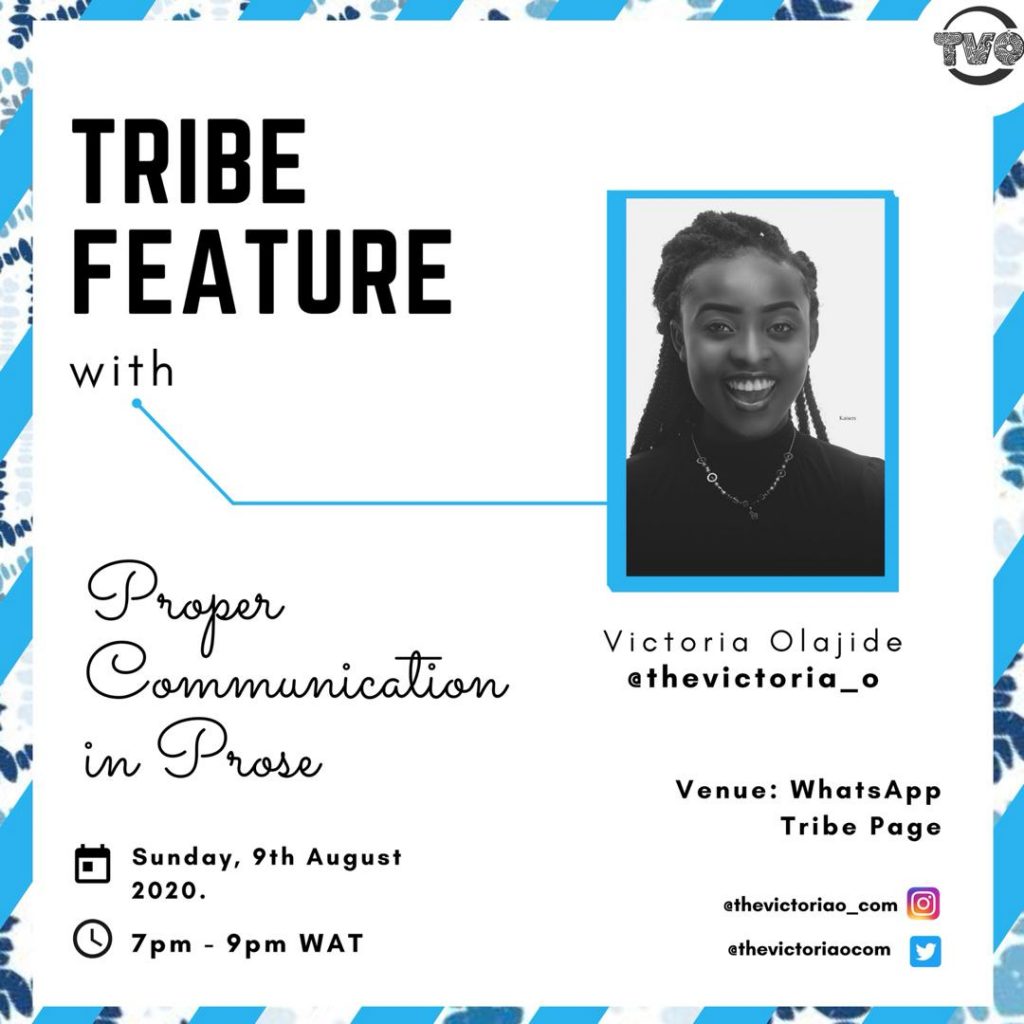Compiled by: Dayo Oluyide

This is the second part of the three day tribe feature. The first was Proper Communication in Poetry with Wale Bailey and now we bring you the second, Proper Communication in Prose. Enjoy!
Victoria Olajide is a Litterateur and Editor. She is also an Author, Entrepreneur and Content Creator. She enjoys conversations on Culture, Afro-futurism, Art, Human rights, travel and most importantly helping writers get better.
Her love for writers and blogging evolved into the TVOTRIBESMEN. TVOTRIBESMEN is a community of writers who inspire one another and are evolving into the best representation of themselves as African Writers. They appreciate growth and creativity.
Her interest in travel led to TVOTRAVEL –A brand that helps travelers travel better and more comfortably. We provide Travel essentials, advice and Mental Health tips.
We offer free consultation sessions on writing and content creation (sign up here https://tinyletter.com/THEVICTORIAO). We also compile these sessions alongside other information we’ve shared on various teaching platforms in our Content Creation Masterclass EBook. You can make a purchase by sending an email to ovictorie@gmail.com
Communication
You want to see communication as a necessary tour. Communication is why we are alive; it’s the essence of living and developing one’s self. It is the essence of reading, writing, and spending time listening. Your total literary package needs proper understanding of communication to flourish, reach and speak.
Most writers think that a jumble of words and synonyms can create a poetic or sensible energy for your writing. However, this is not very true, because making your work as lucid as possible will give your audience a better time comprehending what your message is about, and give other judges/writers the opportunity to appreciate your art and accord it some value.
So, most times it’s not that you don’t deserve an award/prize after participating in the ‘54th Competition’. It’s that we don’t know what you’re saying.
Clarity is a term used in prose and poetry. It is a system that is also used as judging criteria for writers. To see beyond your “grammar”, “poetic lining” and “philosophies” and reveal how clear your work is. It is a characteristic of a speech or a prose composition that communicates effectively with its intended audience. Also called Perspicuity
The qualities of clearly written prose include:
- A carefully defined purpose,
- Logical organization,
- Well constructed sentences,
- And precise word choice. How can I get my message as clear as possible?
Prepare yourself: Emotionally and psychologically. I remember we had a conversation once on the Tribe page about what gets you back in the mood to write after a break. Some people take wine, some sleep, etc. You need to prepare yourself for a journey, into words and creativity. A space only you can decipher what happens. What works and doesn’t. You have to give them the best that your creative energy can develop. Let’s all get to the point of preparing ourselves.
Clear beginnings: Selecting the right introduction is one of the strongest points you can have as a writer. Clarity is an important virtue, and especially at the beginning of a prose piece. Some writers seem to resist clarity, to write confusingly on purpose. Not many would admit to this, but it exists. The thought exists. However, a lot of those authors/writers we look up to use simple words, but then turn out to be intriguing as we gradually progress.
Example: In the beginning, there was a river. The river became a road and the road branched out to the whole world. And because the road was once a river it was always hungry. – The Famished Road by Ben Okri. This short introduction explains the whole essence of the novel. You see that it’s clear and simple. It is also used to clarify.
Carefully decipher the purpose of your work: Is this work to inform or confuse? Am I writing a debate or speech? The purpose of your work will help in highlighting the agent of communication, your choice of words and pattern of presentation. Purpose = Manner of presentation.
Logically highlight your questions and give answers to them: When I wrote logical progressions in writing (read here http://thevictoriao.com/logical-progressions-in-writing/). I highlighted cogent points that we miss out on, when arranging our words for presentation. Your words should have a logical progression and rhetoric sequence. Take each point after the other. Finish establishing a thought around the one that was communicated in the first paragraph, before moving to the next.
Review: Give your written pieces to various editors to review for you. Beyond publishing or publicizing your “heartfelt” messages, review them. You can make some verb replacements, correct punctuation errors, replace certain words with synonyms, etc. NEVER SUBMIT YOUR FIRST DRAFT! That’s a mistake we all make –sending out an unprepared piece.
In conclusion, in proper communication, you can either be the receiver, message/messenger or the sender. As a writer; you are everything! You receive all these information in your mind, sometimes they overwhelm you. Even if they are only subjects of your imagination.
You become all that your mind is composing so you can write down genuinely.
You send it, you send your works and they become voices in the hearts of other readers.
Like Mr. Wale Bailey shared with us yesterday “to communicate well, you must have been communicated well to.”
A writer is not a writer until his/her work is communicated, i.e. humans have found meaning to your work, and it connects to them. They understand what you’re sharing. To properly communicate, you become all that is in communication, and see with the audience’s lens.



Pingback: Recalling Our Forgotten Stories: Africa's Oral Tradition - TVO TRIBE